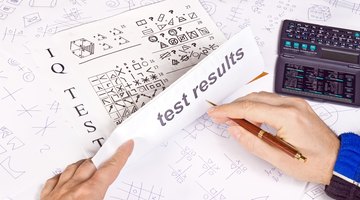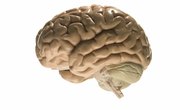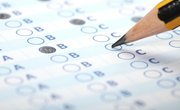Raven's Advanced Progressive Matrices is a non-verbal reasoning test that is used to measure one's ability to use reasoning and logical ability. The Raven tests use images placed in a 2x2, 3x3 or 4x4 matrix that follow a logical order or pattern. The goal of the test-taker is to discover the pattern. Since the Raven tests do not rely on any language abilities or previous knowledge, the tests are believed to be a reliable indicator of a person's general intelligence, or IQ. Converting a Raven score to an IQ score is possible using a few short steps.
Take the Raven Advanced Matrices test and find out your score on the test. For example, assume your raw score on the test was a 26.
Determine your percentile rank in the Raven test. For example, according to one table published by the Prometheus Society, a score of 26 corresponds to a percentile rank of 75 for someone between the ages of 33 and 37. You may want to check multiple sources for this rank, as measurements from different sources may yield different rankings.
Find the area under the curve of a normal distribution (as IQ scores follow a normal distribution) that corresponds to a z-score (a statistical measure) of 0.75. According to a chart published by SoftStat, the relative frequency of this score is 0.2486.
Find the score that corresponds to the relative frequency of the z-score. For a normal distribution, the relative frequency 0.2486 corresponds to a value of 111. Therefore, a Raven Score of 26 would convert to an IQ of 111.
Tip
There are many different means of measuring and scoring IQ, and therefore there may be many different ways of comparing your score in the Raven Advanced Matrices test to a specific IQ score. The method outlined here is only a means of approximating the conversion between these two scores.
Related Articles
References
Tips
- There are many different means of measuring and scoring IQ, and therefore there may be many different ways of comparing your score in the Raven Advanced Matrices test to a specific IQ score. The method outlined here is only a means of approximating the conversion between these two scores.
Writer Bio
Thomas Bourdin began writing professionally in 2010. He writes for various websites, where his interests include science, computers and music. He holds a Bachelor of Science degree in physics with a minor in mathematics from the University of Saskatchewan and a Master of Science in physics from Ryerson University.











